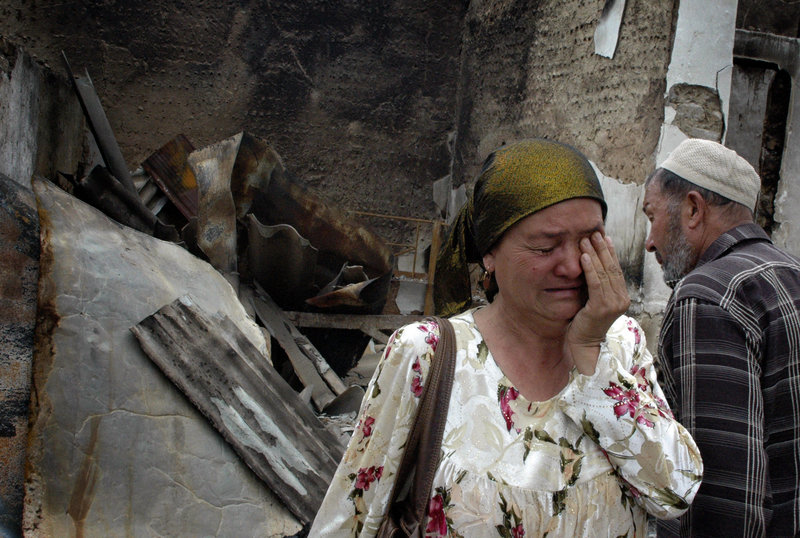OSH, Kyrgyzstan — An estimated 400,000 people — nearly one-twelfth the population — have fled their homes to escape Kyrgyzstan’s ethnic violence, the U.N. said Thursday as throngs of refugees huddled in grim camps along the Uzbekistan border without adequate food or water.
That figure represents half the roughly 800,000 ethnic Uzbeks who lived in Kyrgyzstan’s south before Central Asia’s worst ethnic violence in decades erupted there last week. More than 200 people — possibly many more — have been killed, and Uzbeks have been all but purged from some parts of the south.
Ethnic Uzbeks on Thursday accused security forces of standing by or even helping ethnic-majority Kyrgyz mobs as they slaughtered people and burned down neighborhoods. Col. Iskander Ikramov, the chief of the Kyrgyz military in the south, rejected allegations of troop involvement in the riots but said the army didn’t interfere in the conflict because it was not supposed to play the role of a police force.
The military and police set up roadblocks and began patrols this week after the worst violence was over.
Uzbeks interviewed by Associated Press journalists in Osh, the country’s second-largest city, said that on one street alone, ethnic Kyrgyz men sexually assaulted and beat more than 10 Uzbek women and girls, including some pregnant women and children as young as 12.
Matlyuba Akramova showed journalists a 16-year-old relative who appeared to be in a state of shock, and said she had been hiding in the attic as Kyrgyz mobs beat her father in their home.
Akramova said that when the girl came downstairs to bandage her father’s head, attackers sexually assaulted her in front of him.
“What they did to her — even animals wouldn’t do that,” Akramova said.
Members of the Kyrgyz community have denied accusations of brutality and have accused Uzbeks of raping Kyrgyz women.
Eyewitnesses say many Kyrgyz were killed in the unrest, but most victims appear to have been Uzbeks, farmers and traders who speak a different language and have been more prosperous than the Kyrgyz, who are from a nomadic tradition.
Kyrgyzstan’s interim government has accused the deposed president of igniting long-standing ethnic tensions by sending gunmen in ski masks to shoot both Kyrgyz and Uzbeks. The government, which overthrew President Kurmanbek Bakiyev in April, says he and his supporters were trying to reassert their grip on the main hub for Afghan heroin trade in the area.
Send questions/comments to the editors.



Success. Please wait for the page to reload. If the page does not reload within 5 seconds, please refresh the page.
Enter your email and password to access comments.
Hi, to comment on stories you must . This profile is in addition to your subscription and website login.
Already have a commenting profile? .
Invalid username/password.
Please check your email to confirm and complete your registration.
Only subscribers are eligible to post comments. Please subscribe or login first for digital access. Here’s why.
Use the form below to reset your password. When you've submitted your account email, we will send an email with a reset code.